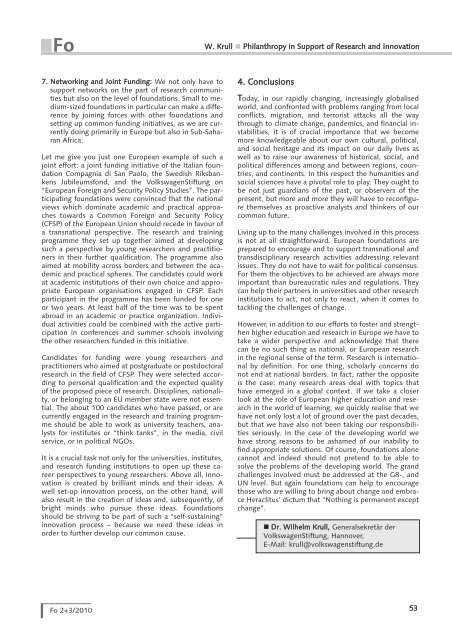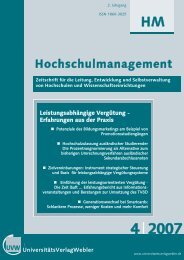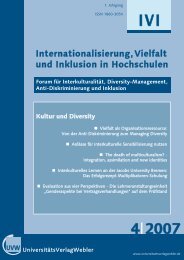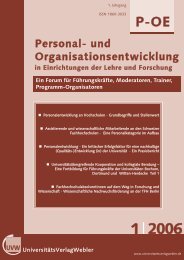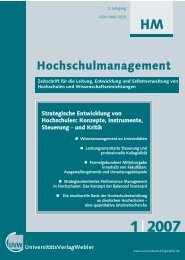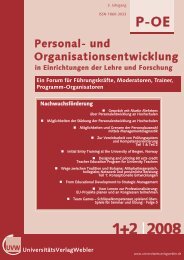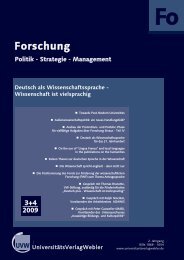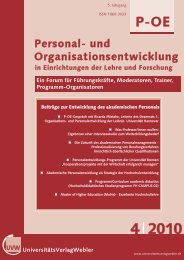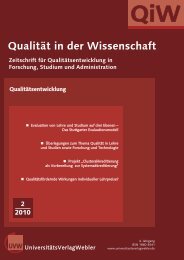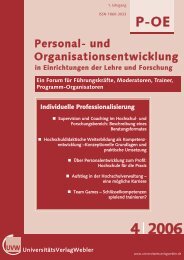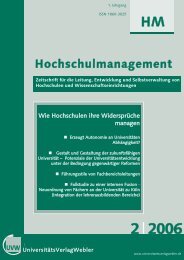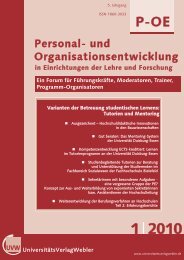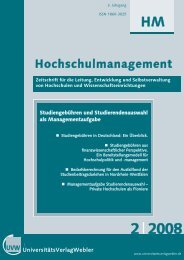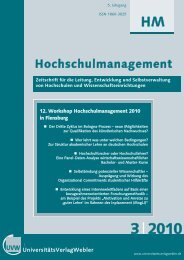Fo - UniversitätsVerlagWebler
Fo - UniversitätsVerlagWebler
Fo - UniversitätsVerlagWebler
Erfolgreiche ePaper selbst erstellen
Machen Sie aus Ihren PDF Publikationen ein blätterbares Flipbook mit unserer einzigartigen Google optimierten e-Paper Software.
<strong>Fo</strong><br />
W. Krull • Philanthropy in Support of Research and Innovation<br />
7. Networking and Joint Funding: We not only have to<br />
support networks on the part of research communities<br />
but also on the level of foundations. Small to medium-sized<br />
foundations in particular can make a difference<br />
by joining forces with other foundations and<br />
setting up common funding initiatives, as we are currently<br />
doing primarily in Europe but also in Sub-Saharan<br />
Africa.<br />
Let me give you just one European example of such a<br />
joint effort: a joint funding initiative of the Italian foundation<br />
Compagnia di San Paolo, the Swedish Riksbankens<br />
Jubileumsfond, and the VolkswagenStiftung on<br />
“European <strong>Fo</strong>reign and Security Policy Studies”. The participating<br />
foundations were convinced that the national<br />
views which dominate academic and practical approaches<br />
towards a Common <strong>Fo</strong>reign and Security Policy<br />
(CFSP) of the European Union should recede in favour of<br />
a transnational perspective. The research and training<br />
programme they set up together aimed at developing<br />
such a perspective by young researchers and practitioners<br />
in their further qualification. The programme also<br />
aimed at mobility across borders and between the academic<br />
and practical spheres. The candidates could work<br />
at academic institutions of their own choice and appropriate<br />
European organisations engaged in CFSP. Each<br />
participant in the programme has been funded for one<br />
or two years. At least half of the time was to be spent<br />
abroad in an academic or practice organization. Individual<br />
activities could be combined with the active participation<br />
in conferences and summer schools involving<br />
the other researchers funded in this initiative.<br />
Candidates for funding were young researchers and<br />
practitioners who aimed at postgraduate or postdoctoral<br />
research in the field of CFSP. They were selected according<br />
to personal qualification and the expected quality<br />
of the proposed piece of research. Disciplines, nationality,<br />
or belonging to an EU member state were not essential.<br />
The about 100 candidates who have passed, or are<br />
currently engaged in the research and training programme<br />
should be able to work as university teachers, analysts<br />
for institutes or “think tanks”, in the media, civil<br />
service, or in political NGOs.<br />
It is a crucial task not only for the universities, institutes,<br />
and research funding institutions to open up these career<br />
perspectives to young researchers. Above all, innovation<br />
is created by brilliant minds and their ideas. A<br />
well set-up innovation process, on the other hand, will<br />
also result in the creation of ideas and, subsequently, of<br />
bright minds who pursue these ideas. <strong>Fo</strong>undations<br />
should be striving to be part of such a “self-sustaining”<br />
innovation process – because we need these ideas in<br />
order to further develop our common cause.<br />
4. Conclusions<br />
Today, in our rapidly changing, increasingly globalised<br />
world, and confronted with problems ranging from local<br />
conflicts, migration, and terrorist attacks all the way<br />
through to climate change, pandemics, and financial instabilities,<br />
it is of crucial importance that we become<br />
more knowledgeable about our own cultural, political,<br />
and social heritage and its impact on our daily lives as<br />
well as to raise our awareness of historical, social, and<br />
political differences among and between regions, countries,<br />
and continents. In this respect the humanities and<br />
social sciences have a pivotal role to play. They ought to<br />
be not just guardians of the past, or observers of the<br />
present, but more and more they will have to reconfigure<br />
themselves as proactive analysts and thinkers of our<br />
common future.<br />
Living up to the many challenges involved in this process<br />
is not at all straightforward. European foundations are<br />
prepared to encourage and to support transnational and<br />
transdisciplinary research activities addressing relevant<br />
issues. They do not have to wait for political consensus.<br />
<strong>Fo</strong>r them the objectives to be achieved are always more<br />
important than bureaucratic rules and regulations. They<br />
can help their partners in universities and other research<br />
institutions to act, not only to react, when it comes to<br />
tackling the challenges of change.<br />
However, in addition to our efforts to foster and strengthen<br />
higher education and research in Europe we have to<br />
take a wider perspective and acknowledge that there<br />
can be no such thing as national, or European research<br />
in the regional sense of the term. Research is international<br />
by definition. <strong>Fo</strong>r one thing, scholarly concerns do<br />
not end at national borders. In fact, rather the opposite<br />
is the case: many research areas deal with topics that<br />
have emerged in a global context. If we take a closer<br />
look at the role of European higher education and research<br />
in the world of learning, we quickly realise that we<br />
have not only lost a lot of ground over the past decades,<br />
but that we have also not been taking our responsibilities<br />
seriously. In the case of the developing world we<br />
have strong reasons to be ashamed of our inability to<br />
find appropriate solutions. Of course, foundations alone<br />
cannot and indeed should not pretend to be able to<br />
solve the problems of the developing world. The grand<br />
challenges involved must be addressed at the G8-, and<br />
UN level. But again foundations can help to encourage<br />
those who are willing to bring about change and embrace<br />
Heraclitus’ dictum that “Nothing is permanent except<br />
change”.<br />
• Dr. Wilhelm Krull, Generalsekretär der<br />
VolkswagenStiftung, Hannover,<br />
E-Mail: krull@volkswagenstiftung.de<br />
<strong>Fo</strong> 2+3/2010<br />
53


